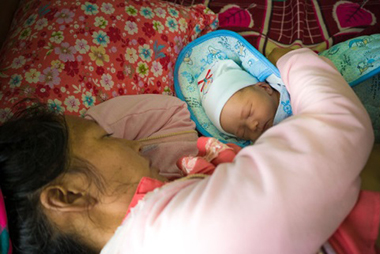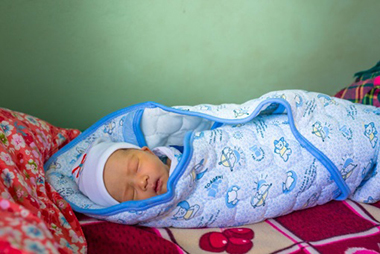Maternal and Child Health Program is a National priority of the Lao Government and the Ministry of Health; maternal, neonatal and child health (MNCH) and nutrition activities are focused on the achievements of MDG 1, 4 and 5; and contributes to the United Nations Development Assistance Framework for outcomes 4 (equitable health and social welfare) and outcome 5 (improved food security and nutrition).
In Phonsaly Province, there are 7 district hospitals and 35 health centres at the village level. Dr Bounsaly said the challenges they faced include the lack of qualified health staff, difficulty of access to some villages located in remote mountainous areas, and a general lack of awareness of villagers on health issues, particularly those of ethnic minorities like Arka, Khmu, Phunoi and Hmong who do not speak the Lao language, which remain an issue for some of the health program and has deterred them from achieving the MDGs.
However in recent years, he has seen a marked improvements with a lower maternal and child mortality ratio with the support of donor programs; and he said that the provincial health department will continue to strengthen the staff capacity and provide medical equipment and motor vehicles for the district and village level staff.
He hopes that donors like Lux Government will continue to fund the MNCH program as the number of women attending family planning counselling, pregnant women getting antenatal checks and reproductive women taking weekly iron folate supplements, delivering their babies in health facility has increased with the free antenatal checks and delivery services, that has helped contributed to a lower maternal mortality ratio.
Health promotion activities will continue to focus on strengthening communication with the ethnic minorities groups to overcome the language barriers. Dr Bounsaly says it is important to provide health education on a regular basis, one time is not enough. He says that health workers have to explain to the villagers, what happen if you do not get vaccinated, and it takes time to change the behaviours based on religious and cultural beliefs of these ethnic groups.
He also hopes to see more students from Phonsaly Province receiving higher education or attending university in Vientiane Capital through scholarships so that when they graduate, they can come back and work in the province. If we try to improve all sectors, health will improve as mothers and children affect the development of the country for the future.
The Lux Government project support the Strategy and Planning Framework for the Integrated Package of Maternal, Neonatal and Child Health (MNCH) Services of Lao PDR 2009-2015 through four UN agencies namely World Food Programme (WFP), United Nations Population Fund (UNFPA), United Nations Children Fund (UNICEF) and the World Health Organization (WHO).
Activities under this UN Joint Program included the distribution of weekly iron-folate tablet for girls and women of child bearing age, deworming against soil-transmitted helminths for children, breastfeeding and other nutrition-related messages targeted at community and schools through the health facility-based and outreach services. Community based distributor (CBD) focused on reproductive health, in encouraging women to attend family planning counselling, birth control and birth spacing through provision of birth control pills and injection, and condoms.
Dr Bounsaly says that “Mothers who attend antenatal checks and deliver in health centres are advised on nutrition, what to eat during pregnancy and after delivery, exclusive breastfeeding for the first six months, and their babies receive their routine vaccination and health checks at the health centres.”
Pregnant women receive some incentive when they visit the health centre for antenatal checks in their final trimester, which include a pack of 10 Kg rice provided by the World Food Programme; or a small allowance for transportation. However, blood test, urine test and ultrasound services are provided for a small fee.
Free delivery services and free medical services for children under 5 from the poorest families has removed the financial barriers of accessing health facilities and promoted health seeking behaviours among parents which has led to a reduction of deaths for children under 5, where the most common diseases are intestinal illness like diarrhoea, fever and respiratory illness, like influenza and pneumonia.


